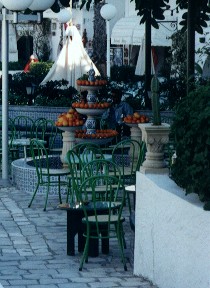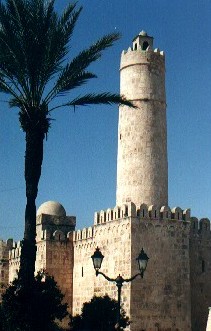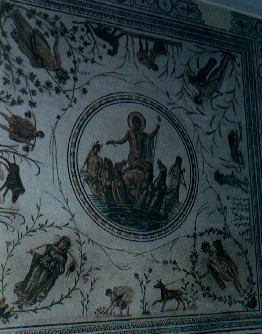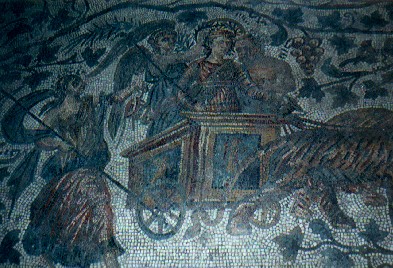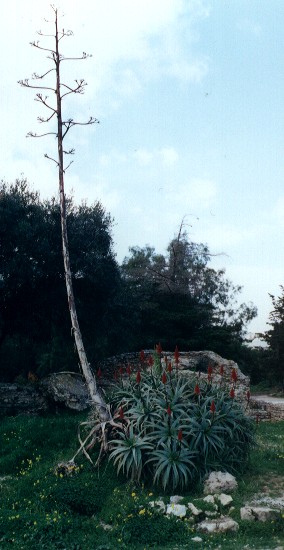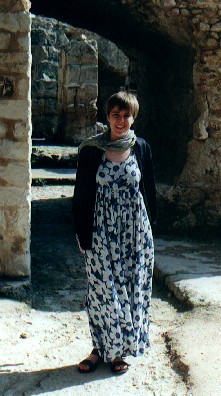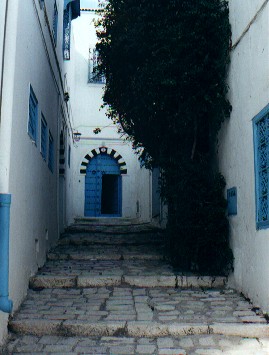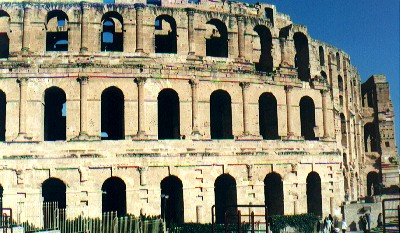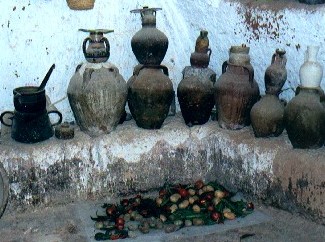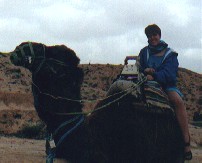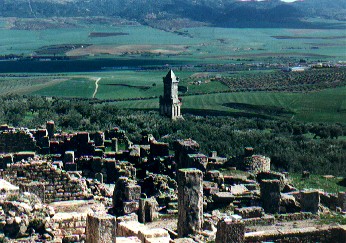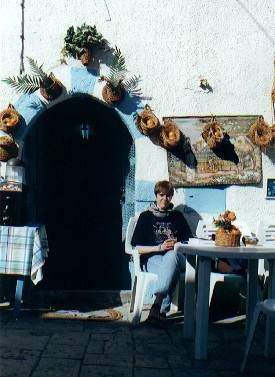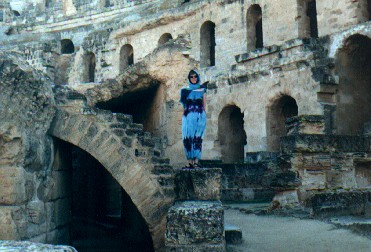
Alone in TunisiaCreated: 23 February 2000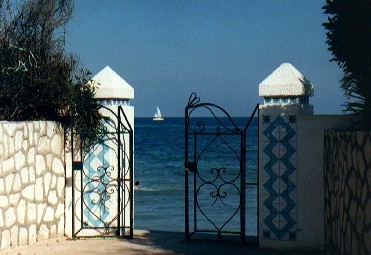
Almost on the spur of the moment, I decided to travel to Tunisia. The day before leaving on another trip, I picked up a travel brochure, decided that Tunisia looked wonderful, and realised if that I wanted to get a cheap package deal I had to book right THEN. I called and booked a week in Tunisia, a month away. Because I had booked so late, there was no room at any of the cheaper inns. I decided to throw caution to the winds and indulge in a little luxury, and I stayed in a very nice hotel called El Hana Palace in Port El Kantaoui, a purpose-built resort town near the city of Sousse. This was to be my first trip in which I both travelled and stayed completely alone, and it was wonderful (as a holiday, I rate it second only to my visit to Easter Island).
I arrived at my hotel on Sunday 6 February in the very early hours of the morning. There was a magnificent bath in my room - large and deep and opulent. True, I couldn’t get the bath taps to work and had to fill it from the shower fitting, but it was wonderful. I was wide-awake, and took a long, deep, lazy bath at 4:00 a.m. It was the first of many long baths, with bubbles and wine and candlelight - until I read about how Tunisia’s tourism industry is seriously depleting its water resources. I tried to be a little more conservative after that. The next day (well, Sunday, the same day, really) was a lazy one. I got up for breakfast - as a rule, I adore hotel breakfasts. I was to be disappointed - the food at my hotel left a great deal to be desired. After breakfast, I went back to sleep for a few hours, and then took a walk along the beach up to the Port El Kantaoui marina. This is a very touristy place indeed, but pleasant in its own way and a good ‘introduction’ to what I was to experience in Tunisia.
The most striking aspect of the Tunisian experience for a young single woman travelling alone has to be the constant male attention. You cannot believe the levels of testosterone I encountered! There seem to be young men everywhere, and it is amazing how much sexual interest can be conveyed in a simple look. Within minutes of walking into a shop, I would be quizzed about the existence of a husband or companion, and I received more invitations, from strangers, in the week I spent in Tunisia than I have received in my entire life. The hotel was not much of a refuge - within a couple of days, word had circulated that I was alone and I received invitations to spend my waiter’s day off with him, to go for a midnight walk with the porter, etc. The receptionist even called me over to share his handful of pistachio nuts with me! Now, like most women, I’ve experienced a fair amount of harassment in my life and, regardless of what many people might think, it is neither flattering nor welcome. I will say this for my experiences in Tunisia, though - the most physical it ever became was an unwelcome caress on the arm. There were very few places that I felt afraid (in fact, the Tunis medina was the only place where I felt really threatened). The men were usually polite and respectful, and refusal was accepted with good grace and humour. Although some approaches certainly crossed the line, most were simply inoffensive expressions of interest, and this was a bit of a balm to a very sorely-bruised ego. I did use a couple of ‘tricks’ to reduce the quantity (and quality ;)) of attention I received when I travelled around alone. I used a headscarf, wore dark glasses to disguise eye contact, and answered ‘yes’ to any queries of whether I was married. The headscarf, particularly, made a huge difference, and I would recommend it. Very few Tunisian women of my age wear headscarves today, but I found that it emphasised my lack of availability to the younger Tunisian men, and was taken as a sign of respect by the older men and woman. Other tourists may look at you strangely, and the younger local women definitely will. Remember that for them it may seem strange that a foreign woman would want to cover her head when the right not to do so has been so recently won for Tunisian women. At best, it may be seen as a sign of being hopelessly old-fashioned ;)
I spent most of my second day in the medina (old walled town) in Sousse. It was wonderful. I started with a visit to the ninth century Great Mosque. Non-Muslims were restricted to the courtyard, but were allowed a glimpse into the beautifully simple, vaulted prayer rooms.
Across from the Mosque stands the ribat, an eighth century fortified Islamic monastery. Three stories surround a central courtyard, and a Ninth Century addition, a round watchtower, overlooks the medina, the Mosque and the bay. Braving my fear of heights (it wasn’t really all that high), I climbed to the top and gingerly edged around - imagine my horror when my foot slipped down into the stairwell! I was convinced I was going to plunge to my death, but, once my heart rate normalised, I was none the worse for the experience.
I spent a few more hours wandering around the medina - through the souqs (marketplaces), through the residential backstreets, up to the kasbah (fort), through narrow, covered streets and large gates set in the city walls. It was wonderful, even though my walks through the souqs had to be regularly punctuated with repetitions of 'La, shukran' ("no, thank you"). On arriving back to the hotel, I decided to spoil myself. I had read about Tunisian hammams and was intent on experiencing them for myself. My experience in the Sfax hammam (a few days later) was to be one of the highlights of my trip. But, on Monday, I contented myself with luxuriating in the tourist version: Half an hour in the steamroom, coated with a mixture of ground seaweed and eucalyptus oils, followed by a shower, a face mask, another shower, and a full body massage. It was a pricey luxury, but I considered it TD30 (Tunisian dinar) well spent. Having read about the sexual repressiveness of Tunisian society, and having already witnessed its results when young men come into contact with the foreign women around whom so many sexual stereotypes abound, I was very surprised when the female attendant was replaced by a man when it was time for the (naked) full body massage. This was a moment of truth for me! I don’t mind nudity and, intellectually, it makes no difference to me whether my massage therapist is male or female. And I am single, for just about the first time in my adult life. But somehow my conscience isn’t single yet (damnit!) The deciding factor, finally, was my realisation that this man quite possibly had access to my room key. He quickly sensed my discomfort, and I was relieved when he made up my mind for me by asking if I preferred the woman to return. I did, although not without the teensiest bit of regret.
On Tuesday, I got up very early to meet my bus. I was going on a coach trip (the first of three) to visit Tunis, especially the Bardo Museum, Carthage and Sidi Bou Said. The drive to Tunis was very pleasant - I had not yet gotten tired of sitting in bus seats. Our first stop was at the Bardo Museum. This was absolutely incredible! I certainly believe what I’ve read about their collection of Roman mosaics being the finest in the world. Room after room filled with ancient stone mosaics, each more impressive than the last. And although the mosaics were the most memorable items there, there was plenty more to see. Unfortunately, the Islamic department of the museum was quite disappointing. But the mosaics were fantastic! The museum has no website, so I cannot provide a link :(
We then drove onto the site of the ancient North African Phoenician (Punic) city of Carthage. Very little remains of this civilisation, but the Romans used the same site for their city after the Punic defeat. We only had time to visit the site of the ancient Roman baths of Antonius Pius. I found them awe-inspiring - although I was soon to discover that they pale in significance compared with other local Roman ruins.
The last stop of the day was in Tunis itself. I left the bus for an hour and a half in the medina, but I must say that it was not an enjoyable experience. I soon left the touristy souq area, annoyed by the aggressiveness of the shopkeepers, and wandered around the side streets. The medinas are sometimes close to impossible to navigate with a map, and I was rather proud of myself for finding No. 33 Rue Tourbet el-Bey, where famous historian Ibn Khaldoun was born in 1332. But I felt increasingly intimidated by the groups of young men hanging around the otherwise empty streets, and soon headed back for the main thoroughfares. On the whole, I didn’t enjoy Tunis.
Against the advice of just about everyone to whom I mentioned it, I travelled alone to Sfax the next day. The Lonely Planet Guide to Tunisia had recommended it as a laidback, non touristy city, and I decided that I was tired of stuffed camels. Tunisians and the tourist industry do not seem to believe that there would be anything a tourist would want to do in Sfax and few seem to venture there - this suited me just fine! I caught a train from Sousse (where it edges its way through the traffic of the main square). I was very fortunate in that I met a really nice couple from England, Tony and Riet - we travelled together on the train and returned together again, later in the day, and I hope to visit them soon on my upcoming trip to England. I have seldom so much enjoyed the company of people I have met by chance. On arriving in Sfax, I headed straight for the medina. Although there were a few things I wanted to do and see, I had one main objective for the day. I wanted to visit an hammam!
Let me explain what I knew about hammams. In fact, let me quote from the Lonely Planet Guide to Tunisia, which was my chief source of information about Tunisia:
I arrived in Sfax and headed straight for the hammam. Although I knew it would not be open to women until noon, I wanted to make sure that I would be able to find it later. I spent some time in the rather nice Dar Jellouli museum (where I also had my first intimate encounter with a squat toilet) and then wandered around the streets and markets. I loved Sfax’s medina - it was relaxed and friendly, and I felt I could browse in the souq without the aggressive pressure to buy which is felt in the more touristy towns (those in Sfax, by the way, were used as the setting for the Cairo souqs in The English Patient). I loved the tiny barbershops, I loved watching people having to move baskets of bread from outside the shops so that vehicles could fit around the corners, I loved the little almond biscuit I bought from a streetside bakery. I loved the long, twisting cul-de-sacs. I loved the fact that the little boy who directed me back to Hammam Sultan (the oldest hammam in Sfax) wouldn’t accept the dinar I wanted to pay him for his trouble. Just before noon, I arrived back at the hammam. I entered the wide doorway, and saw two much-scarved women reclining on grubby cushions on a bench-like alcove, in the one wall, and a shabby curtain hanging over a doorway leading into the building, in the other. I tried to ask if the hammam was open, only to find that neither woman spoke French (until now, everyone I had spoken to had spoken at least French, and most had spoken English and one or two other languages in addition to Arabic). Not knowing whether they were staff or customers, I pushed open the curtain and looked through – no one was inside, but the older of the two women said something to the other, limped over to the curtain and pushed it aside. I gathered that she was in charge. We entered into a dark, rather dank room, with concrete platforms covered with mats. The other woman sat down, and so did I, resolving to watch her carefully and do more-or-less whatever she did. After a long pause, the woman paid her money and started to undress. I wasn’t sure how much to pay, and didn’t know how to ask (I had swotted up a bit of basic French for the trip, but I had only learned the Arabic for 'hello', 'goodbye', 'yes', 'no' and 'thank you'). I offered a handful of coins and the proprietor took TD4. I was pretty sure she was overcharging me - I think TD2 was the standard fee. But, for a change, I didn’t want to haggle. Anyway, she gave me a few extras. In deference to my foreignness, she lent me two striped fouta (a kind of small cotton towel which can be used like a sarong), which I had read are usually only used by men, women generally keeping their underpants on in the hammam. She also gave me half of a plastic juice bottle, using gestures to show me that I should use this to pour water over my body. I noticed that the other woman had brought a plastic jug and toiletries - I stupidly hadn’t even thought of bringing soap or other washing things, having had a hot shower and washed my hair in my hotel that morning. I had not brought my camera - I knew I couldn’t take it into the steamy bathrooms with me, and I didn’t want to risk having it stolen while I was inside. In fact, I had carefully made sure that I brought nothing irreplaceable with me. Nevertheless, I was a little worried that my bag with all my clothes in it would disappear while I was inside - I don’t know what I would have done if it had. However, there was nothing to be done about it, and after undressing, the proprietor took my glasses, pushed open a rusty, metal door and ushered me inside. The other woman had gone in some time before, and I peered through hesitantly. It opened on a dark passage, which I could see led into another room. The proprietor gestured and said something like 'Insh, insh', which I assume meant 'inside, inside' in Arabic, and I ventured into the next room. It was empty except for a few rusty buckets, and smelled very dank. The place was dirty. I’d say it was filthy, but it wasn’t filthy with, well, filth. It was just dirty, as a wet, airless (of course there were no windows) place where people have washed themselves for generations would be. I continued on past some shower cubicles, for want of a better word, and finally into a second room. This was the last room, and was where I found my bathing companion. I seated myself on the concrete platform across from her and looked around, feeling very ignorant and rather embarrassed. She was washing herself from a collection of rusty metal buckets. I looked around and saw a pile of them near me, but I had no idea of where to get the water. Then a broken plastic bucket, the kind in which one can buy nappy steriliser, on top of what looked like another raised platform caught my eye. I seized a bucket and walked over to it. There was a hole in it, and I used the plastic bucket to dip steaming water from this ‘well’. Taking it back to my seat, I started to wash, very carefully as the water was really hot. It was at about this point that I noticed the huge cockroach (one of my pet hates) on the opposite wall – but I stoically averted my eyes and pretended it wasn’t there. A gesture from my companion headed me towards the cold-water tap, and now I really could wash – although I had no soap, etc. Still, I did a fairly good job of it, rinsing my hair and body. The room was not steamy, but it was quite hot, and I was soon sweating. I tried to use my hands to rub myself down as she was doing with a kind of rough glove, which I suspect was the kassa about which I had read. I was determined to wait and see what she would do after she washed - I was fascinated by the fact that I was seeing the authentic other, private side of Tunisian life, and I wasn’t going to miss any of it. Of course, this meant killing a certain amount of time while she continued with her very thorough ablutions. The ice was finally broken when she called me over to ask me to wash her back for her. This involved using the glove to vigorously rub off layers of dead skin. She thanked me nicely, and I returned to my ‘corner’ and started to rinse my hair. This was when she decided to take pity on me. I could almost see her thinking that here I was, a poor girl, far away from home, without even a bar of soap to my name. She offered her shampoo to me, and I didn’t have the heart to refuse. In fact, I really appreciated the gesture. I washed my hair (again!) and, as always, used the shampoo lather to wash my body as well. She was obviously watching me as much as I was watching her, and she unwrapped her bar of soap and offered it to me as well. I was more reluctant to accept this - but I did, and although I used it very cautiously indeed, I am sure that I managed not to offend her. Time was getting on, and I had a train to catch (the next was five hours later). We had both filled our buckets and emptied them (on the floor) a number of times, and I decided that if I was waiting for her to finish, I could wait forever. I managed to ask her if I should proceed to the showers, and did so. The showers were rusty cubicles topped with rusty hot water cylinders, with taps opening holes in the rusty overhead pipes. My first really unpleasant surprise was noticing a couple of used razor blades in the corner. This was no joke, and I made the shower as quick as possible, bid farewell to the woman who had showed me another side to Tunisian life, and headed back to the disrobing room. This I found empty, but my bag was untouched and I got dressed. I found the proprietor seated a few metres down the road, and managed to understand where she had left my glasses. I left, very pleased that I had had this experience. I met Riet and Tony on the train back to Sousse, and they very kindly gave me a lift in their taxi from the station to the Port El Kantaoui marina, and took me out for a drink when we got there.
Thursday was the day of my coach trip to the South. This was a long, long day, and although I was interested and entertained by many aspects of the trip, it was probably the least enjoyable daytrip of my time in Tunisia. Our first stop was at El-Djem - the site of the huge Roman colloseum, nearly as big as the one in Rome, and probably better preserved.
It was lovely - very impressive indeed. But somehow, I didn’t get the feeling of wonder, the empathy with the past, which I usually feel at this kind of site. Maybe it was the presence of all the other tourists. Maybe I just wasn’t in the right mood. I can honestly say that I enjoyed and was impressed by the visit, but I think I would have found it both more enjoyable and more impressive under different circumstances. Then on the long haul to Matmata. Matmata is special for two reasons. One is that it is the site of Berber ‘troglodyte’ houses. Here Berber families have lived in holes in the ground for generations – huge open-roofed holes in the ground which serve as courtyards, surrounded by smaller, enclosed, cave-like holes which serve as bedrooms, kitchens, storerooms, etc.
The other is that it is the site which was used, because of its remarkable landscape, for some scenes in the first trilogy of Star Wars.
We had a surprise on arriving in Matmata - a camel ride from the bus to the one Berber house that was open to tourists! I was most unsuitable dressed for camel riding, but there was no way I was going to miss the experience.
Friday was the day I visited Dougga and Thuburbo Majus. These Roman ruins really are wonderful. Capitols, winter and summer baths, houses of both the rich and the poor, temples, slave markets, intact mosaics – they’re all there. Some highlights of the visit to Dougga included seeing the old ‘radiators’ in the winter baths; the lurid stone sign pointing the way to the brothel; the public – and I do mean public – latrines – a semicircle of them, with a gutter of water to be shared for post-use washing; the slave market; and the Square of the Winds, with its named winds carved into the ground.
The most beautiful thing I saw there, though, was the third century B.C. Punic tower. It survived for 2100 years, through conquest by the Romans, Byzantines, Vandals and Arabs. But it couldn’t survive British colonialism: In 1842 an inscription stone was removed by the British consul and sent to the British Museum - and the whole tower collapsed! Luckily, it has been restored.
I was to be picked up from the hotel on at midnight on Saturday, my last day. I had to decide whether I would use my remaining dinars for another luxurious session in the hotel hammam, or to pay to keep my room until midnight, and I decided to do the latter. It meant not having to worry about my luggage, and being able to rest and take a shower before leaving for the airport. It was another lazy day, which I spent reading, resting, bathing (last time in that wonderful bath), sitting on my balcony with a glass of wine, and walking along the beach. This was the first time I had used a package-travel group (Panorama Holiday Group) to book and plan a holiday, and I was a little worried that this would be an unsatisfactory experience. I discovered that it was possible to select the best aspects of package-organised travel, and to do my own thing the rest of the time. I had a wonderful, wonderful holiday.
High Points
Low Points
Useful Books from Amazon.com:
Quick travel: 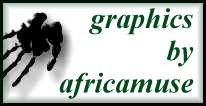
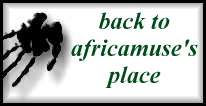
all original material (text, graphics, photographs and programming) © 2000 Sally Smith http://geocities.datacellar.net/africamuse
|
